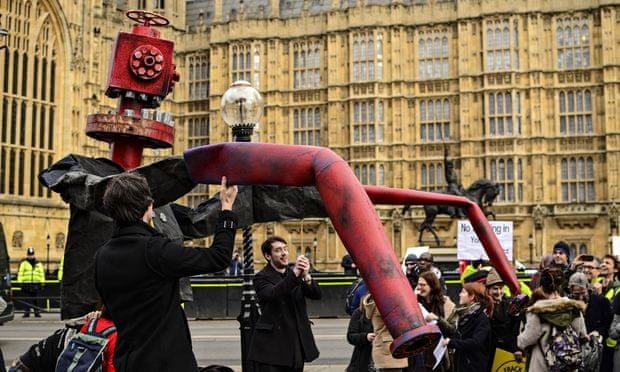|
|
|
|
|
Jim Watson

Environmentalists protest against fracking outside parliament. Photograph: Debra
Jordan/Demotix/Corbis
Heated arguments about whether shale gas should be developed in the UK have intensified yet again in recent days. Strong convictions have been expressed on both sides, but has this latest flurry of debate helped to resolve the uncertainties about the future role of shale in the UK?
Not surprisingly, the answer is not yet. But perhaps some progress has been made. The House of Commons environmental audit committee’s call for a moratorium on shale gas development did not gather enough parliamentary support to be included in the infrastructure bill. However, other significant amendments to the bill were agreed that could help to address some of these uncertainties – potentially in a more effective way.
One of the successful amendments to the bill would require monitoring of potential fracking sites for 12 months before any exploration takes place. If implemented effectively, this process should clearly identify significant impacts on the environment and the health of local populations. It could help to build public trust if it is coupled with a strong enforcement regime by regulators.
Requiring such monitoring might not be popular with developers since it could slow down – or even stop – some shale developments. But, as we have seen over the past two years, simply asserting that fracking is both desirable and safe can backfire. Rather than leading to support for development, the government’s own research suggests that such assertions have strengthened public opposition and mistrust.
In their report this week, the audit committee also argues that fracking must be compatible with our climate change targets. From a climate perspective, fracking is simply another way to produce gas or oil – and it needs to be subject to the same emissions constraints as more conventional means of production. There is some evidence that shale gas may have lower climate impacts than importing gas via tankers from the Middle East. But once again, further monitoring will be required to see whether this is the case in practice.
Fossil fuel companies often argue that gas could play a “bridging role” to a low carbon future. On a global level, that is true – within limits. Recent research by my colleagues at the UK Energy Research Centre showed that global gas use could continue to rise until at least 2025. After that, gas demand would need to fall steeply in order for us to have any chance of keeping global average temperature increases to 2C. At the same time, the global use of coal would need to be reduced even more quickly. The deployment of carbon capture and storage technologies could extend this “gas bridge” by a further 20 years. However, these technologies are still being demonstrated, and they are a long way from commercial viability.
Our analysis did not provide a detailed picture of the UK. However, it is clear that the UK has already gone part way across its own gas bridge. Our switch from coal to gas in power generation started in the 1990s. The scope for further switching to reduce emissions will be limited as carbon emissions limits tighten. Nevertheless, gas is likely to continue to play an important role for many years to come. For example, low carbon technologies will not replace gas heating in many homes and businesses until well into the 2030s and 2040s.
While the environmental impacts of shale gas are critically important, some of the biggest uncertainties are economic. Since almost no shale development has taken place so far, the costs of production in the UK are unknown. Experience from other countries can only be of limited help. Just because low-cost shale production has been possible in the US, it does not automatically follow that the UK will have a similar experience. The UK’s geology is different, and so are factors such as the regulatory regime, population density and the greater integration with international gas markets. Furthermore, recent falls in the oil price and wholesale gas prices has increased the chances that some potential shale developments in the UK will simply be uneconomic.
Given the extent of these economic uncertainties, proposals by some ministers for a shale gas sovereign wealth fund seem premature. Despite all the debate, shale gas is still in the early stages of exploration in the UK. The extent of any full-scale production will depend on the outcomes from this exploration phase.
Even if public concerns can be addressed and the economics prove to be attractive, shale production is unlikely to be significant until well into the 2020s. In the meantime, it is essential that other more pressing priorities such as improving energy efficiency receive the greater attention they deserve.
We will be discussing fracking at a Guardian Live event on 10 February in Manchester, with speakers including Natalie Bennett and Tony Bosworth (FoE)